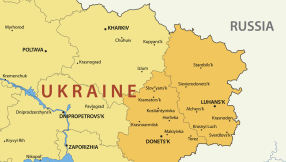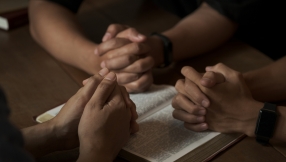
Jewish academic and Hebrew scholar Dr Irene Lancaster speaks to Dr Tricia Miller, the senior Christian media analyst at CAMERA (The Committee for Accuracy in Middle East Reporting and Analysis), and the Founder and Director of CAMERA's Partnership of Christians and Jews.
Irene: Tricia, thank you for taking the time out of your busy schedule to explain your work to readers of Christian Today. Tell me something about yourself.
Tricia: From childhood I have been interested in Jews and Judaism, much encouraged by my parental upbringing. My work at CAMERA is informed by decades of studying antisemitism and the Shoah. As I became older I got involved in Israel advocacy and Christian Jewish relations.
Irene: Do you have any relevant academic qualifications which help you in your advocacy and partnership work?
Tricia: Yes, I have a Masters degree in Theology from Fuller Theological Seminary in Pasadena, California. I also have a PhD in Hebrew Bible from Claremont Graduate University in Claremont, California. I chose to pursue my PhD at Claremont because I wanted to study Hebrew Bible with Jewish academics in order to learn how Jews approach their Scriptures, i.e. Hebrew Bible (Tanach).
Irene: What was the subject of your PhD dissertation?
Tricia: I wrote my dissertation on the Biblical Book of Esther, specifically examining the history of Christian antisemitism by looking closely at the history of Christian interpretation of the Esther story.
Irene: Have you written any books on the subject of Esther and/or Christian antisemitism?
Tricia: Yes. My second book, Jews and Anti-Judaism in Esther and the Church (James Clarke and Co 2015) applies the work done for my PhD dissertation to the ongoing Arab-Israeli conflict, the dispute over Israel's right to exist and defend herself against those whose aim is to annihilate the only Jewish State. I think the story of Esther is extremely relevant to this state of affairs.
Irene: Apart from your Jewish professors, has anyone specifically influenced you from the Jewish community?
Tricia: Yes. In Los Angeles, I happened to meet Israeli philosopher and author, Professor Yoram Hazony, President of the Herzl Foundation in Jerusalem. We learned that we shared an interest in the biblical Book of Esther, on which he has also written two books. We agreed on the relationship of faith and politics, as exemplified by the entire Hebrew Bible, and this shared philosophy led to many fruitful exchanges. As a result, in 2014 I joined CAMERA and began to work for them.
Irene: When was CAMERA founded?
Tricia: CAMERA was founded in Washington DC in 1982 in response to media bias against Israel. CAMERA is the oldest media-monitoring research and membership organization devoted to promoting accurate and balanced coverage of Israel and the Middle East.
Irene: Tell us something about CAMERA's Partnership of Christians and Jews, which you founded.
Tricia: The Partnership of Christians and Jews was founded in 2015 to provide a powerful response to an intensifying effort to delegitimize Israel in evangelical churches throughout North America, the UK and Europe. As these political efforts continue to increase, the Partnership provides educational resources in order to counter anti-Israel campaigns in the media and elsewhere, as well as combat anti-Zionism in the Church. The Partnership also works to build important relationships between Christians and Jews, and thus also help to counter the every growing virus of antisemitism world-wide.
Irene: Could you give us a bit more detail about this work with the Churches and also with Christians and Jews?
Tricia: The Partnership's first public event took place in Los Angeles in 2016. This was an all-day conference, entitled 'The Assault on Evangelical Support for Israel'. We brought together a robust crowd of concerned Christians and Jews. Twelve speakers, including four from Israel, examined aspects of evangelical support for Israel in the light of efforts on the part of certain Palestinian Church leaders to undermine this support for Israel.
Irene: What are the roots of this assault on evangelical support for the State of Israel?
Tricia: The assault on evangelical support for Israel is rooted in a politically-motivated ideological argument that, at worst, maintains that Israel has no right to exist. At least, it suggests political action that would inevitably lead to the destruction of the State of Israel. The argument of these political ideologues is dependent on a re-written, fictitious history that imagines 'Palestinians' as the indigenous people of the Land, and the consequent identification of Jesus as a 'Palestinian'. This political ideology is further based in replacement theology - the idea that Jews and Israel have been replaced by Christians and the Church in the purposes of G-d.
This message, designed to target Western evangelical support for Israel, is an emotionally-laden one that appeals to themes such as peace and justice, while denying history, ignoring facts on the ground, and essentially rewriting Scripture. Inroads are being made in evangelical churches because a significant number of pastors and congregants alike are illiterate concerning the Bible's teaching about G-d's ongoing plans for Israel and the Jewish people.
There has also been an increase in interpreting Scriptures allegorically, rather than according to their plain sense. This results in a misunderstanding of the significance of Israel historically and theologically, which then leads to the message that the State of Israel has no right to exist. These deficiencies then lead to apathy or worse regarding the Jewish people and the State of Israel.
Irene: I find that a very frightening state of affairs. Can you tell us something about its origins in some parts of the evangelical Church.
Tricia: This growing problem in the evangelical world was preceded by decades in the liberal, mainline Protestant churches. Traditional denominations, as well as the Roman Catholic and Anglican churches, departed long ago from any plain sense interpretation of the Bible regarding G-d's ongoing relationship with Israel and the Jewish people. The widespread adherence in all these denominations to replacement theology results in contempt for Jews and Judaism, together with opposition to the State of Israel and its right to exist.
Irene: Does this mean, do you think, that all my own work inputting into clergy training, holding dialogue groups for Jewish and Christians, advising the Chief Rabbinate of the State of Israel on bilateral relationships with the Church of England, has been all in vain?
Tricia: Not necessarily. The solution to the problem of increased biblical illiteracy in the Church and the accompanying rise in Christian opposition to the State of Israel and the Jewish people is to teach the truth. We have to provide essential education to the majority of people who simply don't know what the Bible says about G-d's heart and plan for the people He Himself called to be 'the light to the world.'
Christian opposition to the State of Israel and the Jewish people is nothing more than a Christian version of age-old antisemitism, which had already been demonstrated by the Greeks, Romans and other pagans even before the rise of Christianity.
Irene: What can be done now to encourage a better understanding of Jews by Christians?
Tricia: The only way to eradicate Christian antisemitism is for Christians to make the effort to actually read the Bible, learn the truth and expose erroneous theology. Unless these steps are taken, and without a major revival in the USA, leading Christians to return to the roots of their Christian faith, there will continue to be an increase in antisemitism, as we have witnessed recently.
As the Western rise in antisemitism since October 7<sup>th demonstrates, thoughts, ideas and words lead to physical danger for Jews. If this trend continues, Jews will no longer be safe in the USA, and more and more Jews will make Aliyah to Israel. The Christian world can do much to assist Jews by becoming acquainted with Bible teaching divorced from age-old prejudice. I found that working with Jewish scholars was a particularly useful method of doing this. And, hopefully, more and more Christians will also come to this realization.
Irene: Always good to end on a positive note. Thank you very much for your honest appraisal of Christian-Jewish relations at present, and especially within the evangelical church. It appears that working with Jewish scholars is very helpful in countering Christian antisemitism.













